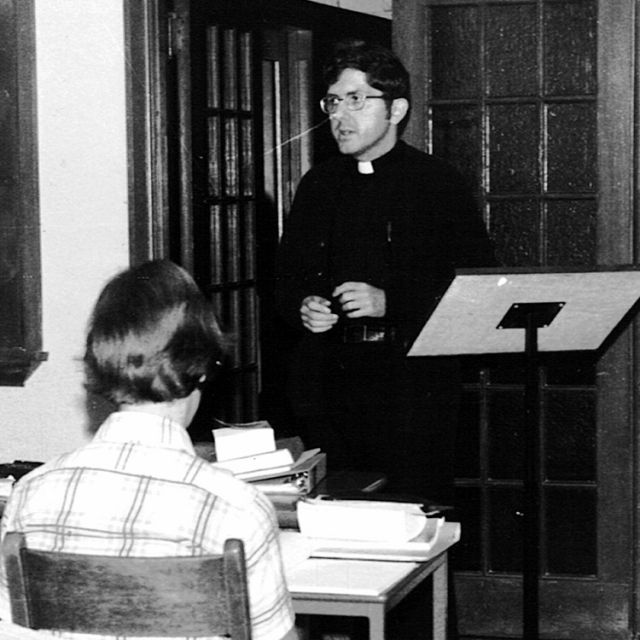Collins did two degrees while attending the seminary. He obtained an MA in middle English at the University of Western Ontario while simultaneously completing his Bachelor of Theology at St. Peter’s in 1973.
Prieur recalls “a model student who was easy to teach.”
“Just sitting there you could see the brain turning all the time and any presentations he did were so colourful,” said Prieur. “By nature I think he’s an introvert but he comes alive when he steps up before a group of people. He was full of creative imagination, has a wonderful sense of humour and is so articulate.”
Watson was impressed by Collins’ breadth of knowledge.
“He was an absolutely brilliant intellectual who was able to draw on so many different strands,” Watson said. “He drew a lot from literature — especially Catholic literature. He drew on Cardinal Newman and the Fathers of the Church and Scripture. He had a wonderful memory and a wonderful mind that could assimilate and weave together all those different strands.
“He sometimes even drew examples from TV shows. I remember one homily in which he preached about the ideal priest based on characters from Star Trek.”
Watson remembers a theology teacher who brought “a great love of the English language and good writing, good speaking and the well chosen word.”
“He always quoted Strunk & White’s Elements of Style. In the margins of your paper he would just put, ‘E.S. 13’ and you knew you had to look up point 13 and that was the flaw in your paragraph, whether it was a run-on sentence or you were being obtuse.”
Both men recall Collins’ love for the writings of Cardinal Newman, Prieur believing it provides “a real key to his spirituality.” Watson concurs: “Newman captured for him the whole idea of the saintly intellect and that’s a phrase that I think describes Thomas Collins — the union of a person of profound prayer with wonderful intellectual gifts who uses those gifts very generously but with great humility.”
They remember Collins as a great lover and collector of books (Prieur recalls that Collins’ ideal form of recreation was walking to a bookstore), but Watson points out that Collins was also a “first-adopter” in terms of new technology.
“Back when not a lot of people had personal computers, he always had one or two that he was working with,” Watson said. “I was here in 1988 and he was working with fairly primitive computer programs back then that would enable him to put Greek and Hebrew into his texts.”
Collins also impressed both men with his efficient time management. When Watson was a student, Collins told him that, first and foremost, he was a priest whose door was always open. “If there’s a crisis or there’s something you really need to talk to me about, come knock on my door any time of the day or night.” said Collins. Watson says he took the invitation to heart at least once. “I had to take him up on that at about two o’clock in the morning and he came to the door in his bathrobe and slippers and said, ‘Come in, sit down, let’s talk.’ ”
An unfailingly approachable priest with a quiet manner, Collins could also be playful or mischievous, sometimes with spectacular effect. Watson recalls that during a course on the Book of Revelation that went just past Easter, Collins was talking about the importance of tradition in the Church. Discussing the singing of the Exsultet and the renewing of baptismal vows, he told the class of a “little known ritual that many people have forgotten in connection with Easter — the breaking of the bunny.”
“And he pulls out a two-pound, solid chocolate Easter bunny and proceeded to start banging it on the desk and we thought he’d gone right off the deep end,” Watson recalled. “Then he came around and gave everybody a piece of the chocolate bunny before we started the class.”
Watson also remembers Collins saying that one of his great memories as a priest and biblical scholar was the time he got to play Scrabble with the late Fr. Raymond Brown, an editor of the Jerome Biblical Commentary who was considered a guru of all things biblical in Catholic circles. Collins described Brown as “so down-to-earth and so unassuming,” Watson said.
“And the same way that he spoke about Raymond Brown, I would speak about him,” Watson said. “That combination is profoundly attractive in a Christian leader. There are those who speak of cardinals as Princes of the Church. And there are some cardinals who probably act like Princes of the Church. Archbishop Collins takes the subway. We want people who are humble and accessible and who people can look to and say, ‘That’s an example of how Christianity should be lived by its leaders.’ ”
Tellingly, Collins did not say who won that game of Scrabble.
Prieur proudly points out that Collins, the first cardinal from St. Peter’s, is scheduled to be the principal celebrant at a Mass on May 22 as the seminary turns 100 years old.
“We booked him two years ago,” Prieur said, “but we all had in the back of our minds . . . could be . . . could be . . . and here it has come to pass. We’ll have our first cardinal celebrating the Mass for the 100th anniversary of the seminary.”
(Gooden is a freelance writer in London, Ont.)



